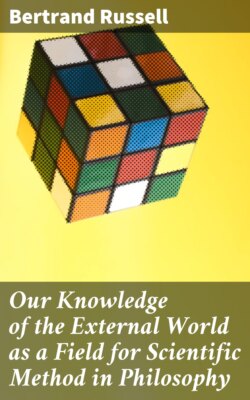Our Knowledge of the External World as a Field for Scientific Method in Philosophy

Реклама. ООО «ЛитРес», ИНН: 7719571260.
Оглавление
Bertrand Russell. Our Knowledge of the External World as a Field for Scientific Method in Philosophy
Our Knowledge of the External World as a Field for Scientific Method in Philosophy
Table of Contents
PREFACE
LECTURE I. CURRENT TENDENCIES
A. The Classical Tradition
B. Evolutionism
LECTURE II. LOGIC AS THE ESSENCE OF PHILOSOPHY
LECTURE III. ON OUR KNOWLEDGE OF THE EXTERNAL WORLD
LECTURE IV. THE WORLD OF PHYSICS AND THE WORLD OF SENSE
LECTURE V. THE THEORY OF CONTINUITY
LECTURE VI. THE PROBLEM OF INFINITY CONSIDERED HISTORICALLY
LECTURE VII. THE POSITIVE THEORY OF INFINITY
LECTURE VIII. ON THE NOTION OF CAUSE, WITH APPLICATIONS TO THE FREE-WILL PROBLEM
INDEX
Отрывок из книги
Bertrand Russell
Published by Good Press, 2019
.....
Evolutionism, if what has been said is true, is to be regarded as a hasty generalisation from certain rather special facts, accompanied by a dogmatic rejection of all attempts at analysis, and inspired by interests which are practical rather than theoretical. In spite, therefore, of its appeal to detailed results in various sciences, it cannot be regarded as any more genuinely scientific than the classical tradition which it has replaced. How philosophy is to be rendered scientific, and what is the true subject-matter of philosophy, I shall try to show first by examples of certain achieved results, and then more generally. We will begin with the problem of the physical conceptions of space and time and matter, which, as we have seen, are challenged by the contentions of the evolutionists. That these conceptions stand in need of reconstruction will be admitted, and is indeed increasingly urged by physicists themselves. It will also be admitted that the reconstruction must take more account of change and the universal flux than is done in the older mechanics with its fundamental conception of an indestructible matter. But I do not think the reconstruction required is on Bergsonian lines, nor do I think that his rejection of logic can be anything but harmful. I shall not, however, adopt the method of explicit controversy, but rather the method of independent inquiry, starting from what, in a pre-philosophic stage, appear to be facts, and keeping always as close to these initial data as the requirements of consistency will permit.
Although explicit controversy is almost always fruitless in philosophy, owing to the fact that no two philosophers ever understand one another, yet it seems necessary to say something at the outset in justification of the scientific as against the mystical attitude. Metaphysics, from the first, has been developed by the union or the conflict of these two attitudes. Among the earliest Greek philosophers, the Ionians were more scientific and the Sicilians more mystical.[6] But among the latter, Pythagoras, for example, was in himself a curious mixture of the two tendencies: the scientific attitude led him to his proposition on right-angled triangles, while his mystic insight showed him that it is wicked to eat beans. Naturally enough, his followers divided into two sects, the lovers of right-angled triangles and the abhorrers of beans; but the former sect died out, leaving, however, a haunting flavour of mysticism over much Greek mathematical speculation, and in particular over Plato's views on mathematics. Plato, of course, embodies both the scientific and the mystical attitudes in a higher form than his predecessors, but the mystical attitude is distinctly the stronger of the two, and secures ultimate victory whenever the conflict is sharp. Plato, moreover, adopted from the Eleatics the device of using logic to defeat common sense, and thus to leave the field clear for mysticism—a device still employed in our own day by the adherents of the classical tradition.
.....